
The topic of advance directives often goes undiscussed between family members and loved ones, and for good reason. It’s a difficult subject to broach. But because this document allows you to spell out how you’d like to be cared for at the end of your life, it’s important have an open conversation with your loved ones to ensure they fully understand your wishes. With varying processes in different states and confusing terminology, questions often arise about the nuances of advance directives. It is helpful to do some research and educate yourself prior to discussing your advance directive with your family members.
These three questions come up regularly for those considering their advance directives, and may prove useful in your end of life planning.
1. What is a power of attorney?
A power of attorney is “a document that allows you to appoint a person or organization to handle your affairs while you’re unavailable or unable to do so.” In terms of advance directives, the power of attorney may be a spouse, other family member, friend or member of your faith community. They are often referred to as your health agent. Think about the people you know best and trust most when choosing your health agent. You are also able to choose alternates in case your original health agent is unable to fill their role. Discuss with them what you deem as a quality end of life, the wishes you want respected and any other information they may need to know when the time comes to make important decisions.
2. Where do I keep my advance directive?
After filling out all the correct documents and reviewing them with your doctor, there are a few more steps to complete. Keep the original copy of the advance directive stored away safely. Try to find somewhere secure, yet easily accessible, like a safety deposit box. You should also create a few extra copies of your advanced directive and distribute them to your doctor, health agent and any other family members you think may need the document. Another way to ensure your wishes are met is to carry a wallet-sized card indicating that you have an advance directive, identifying your health agent and stating where copy of your directive can be found. Taking these steps will help you rest assured that your advance directive will be accessible when it is needed.
3. Can I ever change my advance directive?
You may change your advance directive at any time. If you wish to make changes, you must create a new form, distribute new copies and destroy all old copies. In making these changes, be sure to discuss your new wishes with your doctor and health agent so they have the correct and most up-to-date information.
Although these are some of the more common questions that arise when planning your advance directives, you may need more information to make educated decisions about your final wishes. Don’t hesitate to reach out to our team if you want to discuss further.
Photo Credit: Ken Mayer via Flickr Creative Commons
